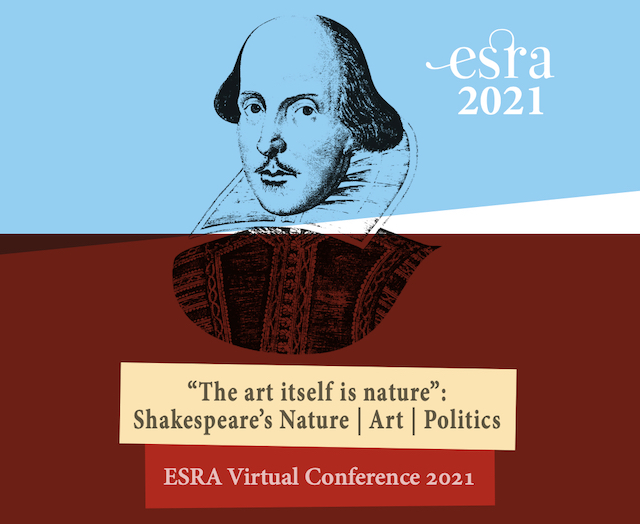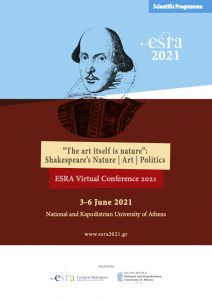
ESRA 2021 Conference Programme
Source
It has now been a couple of months since the delights of the ESRA Virtual Conference 2021 which I believe was a major international gathering bringing together so many scholars, practitioners, specialists, organisations, theatre companies, representatives of government agencies, and participants from around the globe concerned about exploring the inextricable relationship between art and nature as it relates to politics not only in Shakespeare’s era of globalized trade but also in today’s era of environmental and socio-economic crises.
The initiative of European Shakespeareans, officially known as the European Shakespeare Research Association (ESRA), as stated on their website is “to encourage and support research into Shakespeare as a cultural presence in Europe and the relationship between this presence and the construction of European culture and identity.” Organized by the European Shakespeare Research Association and the National and Kapodistrian University of Athens, and ably convened by Prof. Efterpi Mitsi and Dr. Xenia Georgopoulou, the virtual edition of the conference this year has again been hailed a great success, with 150+ researchers joining the four-day event which took place between 3 and 6 June 2021.
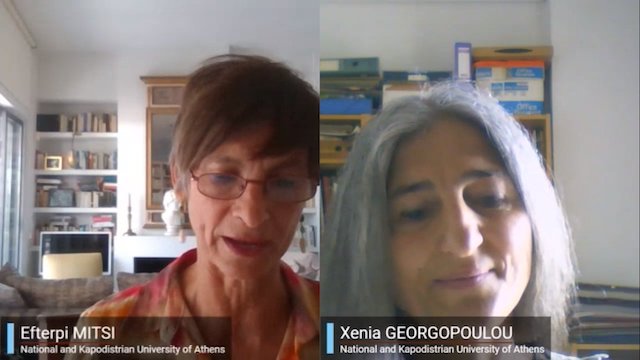
ESRA 2021 Convenors: Efterpi Mitsi and Xenia Georgopoulou
Image provided by the ESRA Convenors
In accord with their mission statement, ESRA 2021 brought together Shakespeare scholars across disciplines and cultures to discuss issues involving nature and art, and explore how the two have influenced politics, with a particular focus on the political as well as the public and private spheres.
This year’s ESRA Conference was meant to take place in the beautiful city of Athens, the first European City of Culture. But due to the ongoing Covid-19 pandemic, the organizers made the difficult but right decision to go virtual for 2021. Presumably, this was yet another reminder of how Shakespeare, in Randall Martin’s words, is our eco-contemporary in prefiguring today’s more urgent global ecological threats.
Despite missing out on a trip to Athens, I nevertheless participated in this virtual edition. The theme this year was “art, nature, and politics”, and the first day started with welcome addresses by Achilleas Chaldaiakis, Dean of the School of Philosophy, National and Kapodistrian University of Athens (NKUA); Aspasia Velissariou, Chair of the Department of English Language and Literature, NKUA; Aikaterini (Kaiti) Diamantakou, Assoc. Professor, Department of Theatre Studies, NKUA; Rui Carvalho Homem, Chair of ESRA, and finally a riveting lecture by the keynote speaker, Prof. Andreas Höfele of University of Munich. The conference also included two other keynote speakers on the second and third days – Jyotsna Singh of Michigan State University and Prof. Sonia Massai of King’s College London.
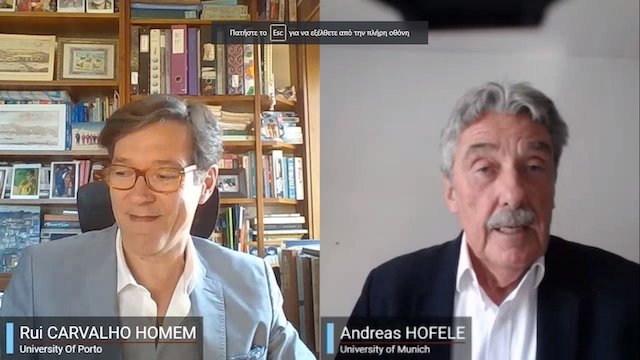
Rui Carvalho Homem and Andreas Höfele
Image provided by the ESRA Convenors
Höfele’s keynote lecture explored the topic ‘Artifice and Animality in The Tempest: Imagining Caliban’ – where he employed a novel artistic and theoretical framework focused on the study of animals through an interdisciplinary lens. Without doubt, he must have deliberately chosen to analyse The Tempest, indubitably the Bard’s farewell play, since it is the culmination of his deep-rooted interest in the human-animal bond. In a similar vein, the second keynote speaker, Jyotsna Singh, gave a lecture titled ‘Caliban’s Dreams; Social Change and the Brave New World of Shakespeare Studies’ in which she also looked at The Tempest among many other plays. On the third day, Sonia Massai delivered the final keynote speech in the conference: ‘Versions of Richard III: From the Nature of the Text to the Politics of Historical Character’.

Sonia Massai
Source

Jyotsna Singh
Source
After the opening ceremony and opening keynote lecture, participants dispersed into a wide variety of research paper panels and seminars. Over the course of four days, there were a total of 154 seminar papers presented in 16 sessions, and 6 panels, including “Portrayals of Pregnancy in Shakespearean Drama”, “The Presence of Liminal Spaces: From Nature to Art to Politics”, “Shakespeare and the Politics of Absence”, “Nature Methodized: Digital Shakespeare Across Europe”, “Language, Politics and Shakespeare Translation in 20th-Century Eastern and Central Europe”, and “Prospero’s Art: Nature, Politics, Visuality in The Tempest”.
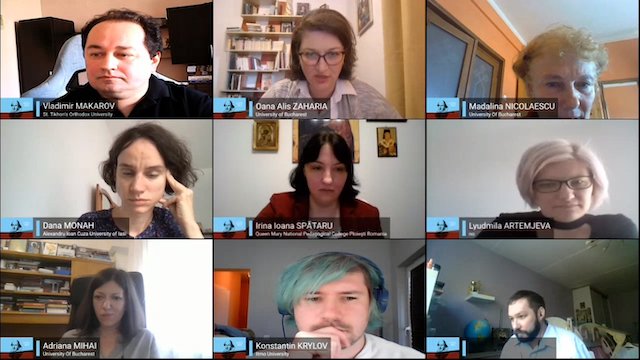
Participants in ESRA Seminar 12: “Changing Policies in Media Ecology: The Case of East European Digital Shakespeare“
Image provided by the ESRA Convenors
I was part of the “Shakespeare and Central/Eastern Europe: The National and Global” seminar hosted by Michelle Assay, David Fanning, and Boris Gaydin. The seminar focussed on the nature of appropriation and adaptation of Shakespeare and his works in the countries of Central and Eastern Europe, including those comprising the former USSR. Cristina-Elena Lascu talked about how William Shakespeare’s creation has been received in Romania over the past half century. Valentina Sandu-Dediu explored the Romanian Opera Hamlet by Pascal Bentoiu in the midst of debates about the “National” and the “Universal” in Music. Oana-Celia Gheorghiu looked at a farcical re-writing of Hamlet as a subversive anti-totalitarian discourse in Romania while Petra Bjelica analyzed a Serbian production of Hamlet as a sign of paradoxical national identity and disillusionment in post-communist Eastern Europe. Marinela Golemi explored the body politics of political adaptations in Albania: Julius Caesar as a palimpsest. And my own presentation explored the topic of ‘Shakespeare in Turkey’, with a particular reference to Shakespearean research and performance in Turkey − from their first appearance on the Turkish page and stage in Ottoman times right through to the present day.
As part of the artistic programme of the event, the delegates had the chance of seeing three Shakespearean productions of the National Theatre of Northern Greece – The Winter’s Tale, directed by the great Romanian director Silviu Purcărete (2018), The Taming of the Shrew directed by Robert Sturua (2011), and A Midsummer Night’s Dream directed by Peris Michailidis (2006). These stunning theatre productions were made available for the conference participants by the strong and generous support from the Artistic Director of the National Theatre of Northern Greece, one of country’s largest theatre institutions which houses nationally and internationally renowned theatre performances.
The soprano Gina Fotinopoulou, accompanied by the pianist Dimitris Yakas, performed four different musical pieces inspired by Shakespeare’s works, either composed to plays or their themes. The recording was prepared especially for the participants of the ESRA 2021 conference.

Gina Fotinopoulou
Photo credit: Panagiotis Barbopoulos | Source

Alexandros Cohen
Photo credit: Nikos Karanikolas | Source

Georgina Kakoudaki
Source
Furthermore, Alexandros Cohen, an accomplished theatre director, shared his opinion on Shakespeare and artistic engagement with his plays. He presented his three Shakespearean performances which are Much Ado about Nothing (2011), Timon of Athens (2014) and Cymbeline (2016). Obviously, his insights were assembled from his successful career as a theatre director and were influenced by his personal relationships with Shakespeare. He ended his presentation saying “We can always return to Shakespeare to find comfort, answers and happiness.” This was followed by a talk from the director Georgina Kakoudaki about her production of Shakespeare’s A Midsummer Night’s Dream for adolescent audiences in an attempt to inspire younger generations and get them involved through new interpretations of Shakespearean texts.
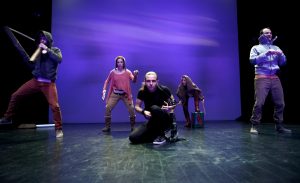
From A Midsummer Night’s Dream production (2013-2015) directed by Georgina Kakoudaki
Photo credit: Marianna Verigaki | Source
The conference was concluded with closing remarks from the organisers. This was followed by the General Meeting of ESRA which took place in a virtual environment.
In closing, I would like to extend a big thank you to each and every researcher who presented a paper, to the members of the European Shakespeare Research Association, who organised the day, to the School of Philosophy and the Departments of English Language and Literature and Theatre Studies, National and Kapodistrian University of Athens, which hosted the event, and more specifically to Prof. Efterpi Mitsi and Dr. Xenia Georgopoulou who convened this wonderful conference celebrating the works of the world’s most-performed dramatist. I truly enjoyed every moment of this fantastic event.
In hopes the Covid-19 pandemic will end then, I look forward to meeting in-person and reconnect with all participants at ESRA 2023 Conference – in Budapest, the heart of Europe!
Information provided by İlker Özçelik the regional editor for Turkey and Postdoctoral Fellow, Süleyman Demirel University, Turkey.


